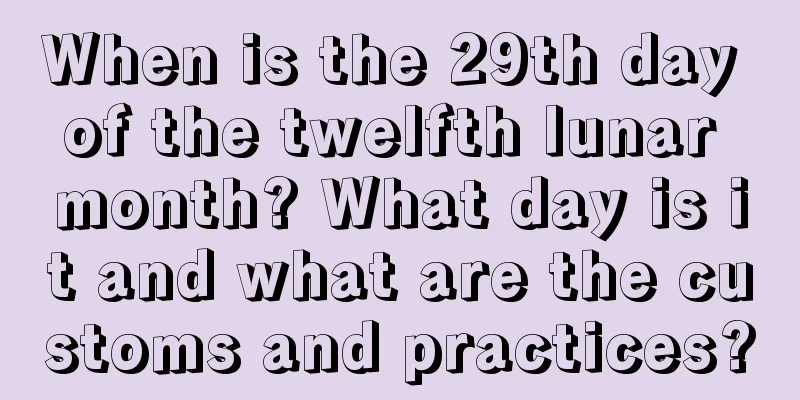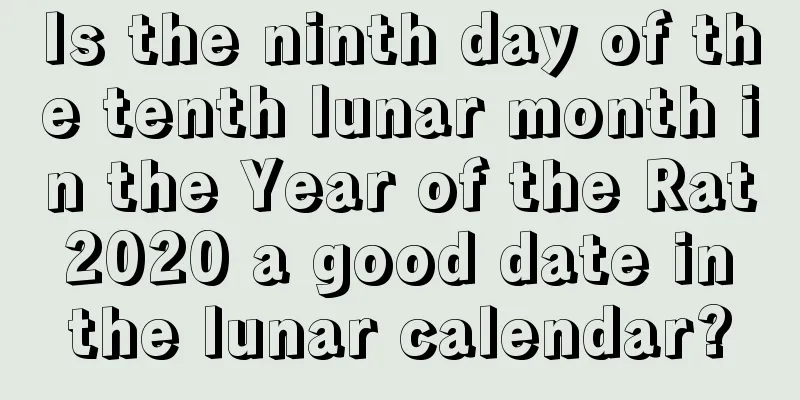When is the 29th day of the twelfth lunar month? What day is it and what are the customs and practices?

Introduction: The 29th day of the twelfth lunar month is actually the 29th day of the twelfth lunar month, which is the day before New Year's Eve. It is an important day in Han folk culture. So are there any folk cultural customs on this day? Now, let’s follow the editor to take a look. Mr. Shui Mo has carefully sorted out many customs and some precautions about New Year’s Eve. If you want to know more exciting content, please go to Mr. Shui Mo’s New Year’s Eve special topic to see more!When is the 29th day of the twelfth lunar month? What day is it?The 29th day of the twelfth lunar month is also called Little New Year's Eve. The 28th or 29th day of the twelfth lunar month, the day before New Year's Eve, is called the Little New Year's Eve, which is a folk culture of the Han nationality. On this day, families hold banquets and people visit each other to say goodbye to the old year. Burning incense outdoors is called "tianxiang" and usually lasts for three days.Regarding the analysis of the 29th day of the twelfth lunar month, New Year's Eve of the 29th day of the twelfth lunar month refers to the last night of the twelfth lunar month of each year, and it is connected with the Spring Festival (the first day of the first lunar month). The word "chu" in "Chuxi" means "to go; to change; to alternate". Chuxi means "the end of the month and the year". People have to get rid of the old and welcome the new. It means that the old year is over and the new year will come. It is the last night of the lunar calendar. Therefore, the activities during this period are centered around getting rid of the old and bringing in the new, eliminating disasters and praying for blessings. During the Zhou and Qin dynasties, at the end of each year, a "Dannu" ceremony was held in the imperial palace, in which drums were beaten to drive away the plague demons. This was called "Zhu Chu". Later, the day before New Year's Eve was called Xiao Chu, or Little New Year's Eve, and New Year's Eve was called Da Chu, or Big New Year's Eve. What are the customs and observances on the 29th day of the twelfth lunar month?On the 29th day of the twelfth lunar month, people visit the graves of their ancestors and offer sacrifices. The Chinese lunar calendar is divided into long and short months. The so-called long month has 30 days, and the short month has only 29 days. Therefore, the twelfth lunar month is a short month, and the twenty-ninth day is the last day of the year. Then the 29th day of the twelfth lunar month is New Year's Eve. Even if it is not a short month, the next day is New Year's Eve, so all preparations for the New Year must be completed on this day. In the entire New Year festival, the 29th day can be said to be the busiest day. In addition to preparing various food, clothing and sacrificial offerings for the New Year festival, there is also an extremely important activity of "visiting the graves to pray to the ancestors". Therefore, the New Year's folk song says, "On the 29th day of the twelfth lunar month, visit the graves of ancestors and ask for great offerings."The worship of ancestors has a long history in China. Treating the dead as if they were alive is not only an important symbol of filial piety, but also a virtue of respecting the elderly. Therefore, every time there is a festival, we have to offer sacrifices to our ancestors. This is not only a way to comfort the ancestors, but also an expression of gratitude and longing for the ancestors by the descendants. The Spring Festival is a major festival, so the ceremony of visiting graves and praying to ancestors is particularly solemn and important. The time for visiting the graves and praying to the ancestors is in the early morning of the 29th day in most areas, while in a few areas it is in the afternoon or dusk on New Year's Eve. The folk song says "On the 29th, steamed buns" The dough is leavened on the 28th, and the steamed buns will start to be steamed on the 29th. People use their imagination to make the buns into various shapes such as longevity peaches and small animals. In Tianjin, people will go to Qiaoxiang Pavilion to ask for Chinese knots on this day, which means "Qiaoxiang brings good luck". Traditional festivals of the Tujia ethnic groupThis day is also a traditional festival of the Tujia people, also called "Tiaonianhui". The Tujia people celebrate the Spring Festival one or several days earlier than the Han people.Legends about the Tujia people's "New Year's Eve": 1. In the Ming Dynasty, Tujia soldiers were ordered to go to the southeast coast to fight against Japanese pirates. As the military order was urgent, they celebrated the New Year in advance and rushed to the front line. The soldiers fought bravely and achieved "the first military achievement in the southeast." To commemorate this expedition, later generations moved the New Year's Day forward and made it a custom. 2. The ancestors of the Tujia people were poor and had to work for the rich on New Year’s Eve, celebrating the New Year in advance so that they could reunite with their families. 3. In the old days, at the end of the year, government troops would come everywhere to drive out the people. The Tujia people would celebrate the New Year in advance and have reunion dinners in order to escape. 4. Tujia ancestors resisted foreign invasions and had New Year’s Eve dinner in advance to prepare for the battle. Summary: Through the above article content, we know that the 29th day of the twelfth lunar month is a very important day. Not only does it have the custom of ancestor worship among the Han nationality, it is also the "New Year's Day" of the Tujia people, which is equivalent to the Spring Festival. Therefore, this day is also very important. I wish everyone a happy, joyful and auspicious new year! |
<<: What is the 24th Dust-Sweeping Day? What are the customs and legends of the Dust-Sweeping Day?
>>: When is the 24th day of the twelfth lunar month in 2017 and what are the customs?
Recommend
Detailed analysis of the fate of people born on Laba Festival in the Year of the Pig
Laba Festival is a festival to commemorate the enl...
Is the day before the beginning of summer good on July 3, 2020? Is today suitable for worshipping ancestors and visiting graves?
Introduction: Every day will have good and bad luc...
Is it suitable to move house on the fifth day of the sixth lunar month in 2020? Can I move into the new house?
The sixth month in the lunar calendar is the firs...
What is the origin of the Spring Festival custom of staying up all night?
The Spring Festival is an ancient festival in my c...
Is it possible to set up the bed on the 27th day of the third lunar month in 2021? Where should the head of a bed not face?
The third month of the lunar calendar is the third...
Should we go out for an outing and say goodbye to the countryside on the Double Ninth Festival? Why do people climb mountains on Double Ninth Festival?
In September, the autumn season arrives, and we we...
Is the 19th day of the winter month in 2019 a good day? Check the auspiciousness and inauspiciousness of the time on December 14th!
Introduction: Different days have good and bad luc...
Query the position of the God of Happiness on the eighth day of the second lunar month in 2020
In the second month of the lunar calendar, the sp...
What is the meaning of the White Dew solar term? What are the solar terms in autumn?
What is the meaning of the White Dew solar term? W...
Is it a good idea to get engaged and married on the ninth day of the first lunar month in 2018?
When is the ninth day of the first lunar month in...
Why do we eat Chongyang Cake on the Double Ninth Festival? What is the meaning of eating Chongyang Cake on the Double Ninth Festival?
Introduction: The Double Ninth Festival is an impo...
Is October 25, 2020 a good day to sign a contract? Check the lucky position of the God of Happiness on December 9
Introduction: Generally, it is necessary to choose...
Is the third day of the sixth lunar month in 2017 a good date to start renovations?
Introduction: Daily work and study bring fatigue t...
Is the 2018 Dragon Boat Festival a good time? Analysis of the 2018 Dragon Boat Festival do's and don'ts!
Introduction: Not only are each day presented in d...
What jewelry can ward off evil? The seven most powerful objects to ward off evil spirits
People want to avoid or drive away evil, hoping th...









